First off I just wanted to say how much I enjoyed the way some of these chapters were written. The ones with the shorter bold titled sections with the bullets. Although it was still alot of information I felt like it flowed better. Hooks stated " I have been most ispired by those teachers who have had the courage to transgress those boundaries that would confine each pupil to a rote, assembly-line approuch."From what I took his response as I really liked it. I saw it that he was inspired by the teachers that didnt fit the avarage everyday teaching style. The teachers who allowed studnets to fell comfortable even when discussing and thinking about things that are outside their comfort zone, student and teacher. The teacher being able to admit that he/she can learn and take new ideas from their students.This allows everyone to get to know each other on a personal level rather than student/ teacher relationships. I think it is very important to know a child’s personality, this allows you to help figure out the best way for them to learn.
Dewey states that there is two sides to education, psychological and sociological. I agree that both are very important and are definitely present in school systems. But he later goes into how school is primarily a social institution, although I think the social aspect is vital to the learning process I would say the mental/ psychological part fits about 50/50. The last thing I wanted to mention was how he defines education as a continuing reconstruction of experiences. I really like how that is stated. I believe education is built upon and life and school experiences are a big part.
Subscribe to:
Post Comments (Atom)



2 comments:
Thank you for posting your thoughts about the readings. I'm curious now to learn more about how these ideas might show up in your classroom?
I completely agree that the classroom should be a comfortable place even when the topics are sometimes uncomfortable. i also think that it is important to get to know each of your students personally. By showing interest in a child's personal life, you show that you genuinely care about them and their feelings. Without this type of relationship it is almost impossible to teach. The students view it as, "If she doesn't care about what I have to say, why should I care about what she has to say?"
Post a Comment